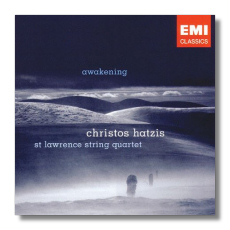
The Internet's Premier Classical Music Source
Related Links
- Hatzis Reviews
- Latest Reviews
- More Reviews
-
By Composer
-
Collections
DVD & Blu-ray
Books
Concert Reviews
Articles/Interviews
Software
Audio
Search Amazon
Recommended Links
Site News
 CD Review
CD Review
Christos Hatzis

String Quartets
- String Quartet #1, "The Awakening"
- String Quartet #2, "The Gathering"
St. Lawrence String Quartet
EMI Classics 5 58038 2 DDD 61:21
In the 1980s, Steve Reich wrote a piece called Different Trains, in which the sampled voices of Jewish survivors of the Holocaust and the sounds of trains – taking them to the concentration camps, or taking them to freedom – were combined with a string quartet, which sometimes imitated the samples. In the first string quartet by Christos Hatzis (b. 1953), the composer does something rather similar, albeit with different results. Hatzis, who came to Canada from Greece, was impressed by the sound of Inuit chanting and throat singing, and incorporated it into several of his works. As a child, he often rode on a locomotive – his father was a railway engineer. Both of these influences can be heard in "The Awakening." The string players are joined by a prepared tape containing both locomotive sounds and Inuit singing. The live musicians play a sort of commentary to the tape… or is it the tape that is commenting on the performance of the live musicians? At times, the music is motoric and harsh; it other times it is reassuring, even inspiring. It is always dramatic. At one point early in the piece, the cello "sings" a melody which Hatzis identifies as his affirmation of his faith in the Divine, "and its ability to bring balance, resolution and simplicity in the midst of the overwhelming complexity we have brought upon ourselves and others."
Lest one think that "The Awakening" is a gimmick or a stunt, the second quartet "The Gathering" is for string quartet alone, and is no less powerful. Hatzis's motivation for writing this quartet was his distress over the situation in Kosovo, and of the fate of the peoples of the former Yugoslavia in general. The four movements are titled, "Awakenings," "Fleeting Moments," "Nadir" (a kind of Totentanz initiated by shouts from the quartet's members), and "Metamorphosis." Throughout the quartet, there are allusions to musical styles typical of the Balkans and of the Middle East – a reflection of the region's diverse influences. Much of the quartet is angry and impassioned; the destructive powers of hatred and warfare are never far away. Nevertheless, Hatzis extends an olive branch at the end of the work by quoting an Eastern Orthodox melody referring to the transfiguration of Christ. Hatzis knows how the world is, but he also knows how the world could be.
The second quartet was dedicated to the St. Lawrence String Quartet, an ensemble formed in 1989 in Canada. Currently, they are the ensemble in residence at Stanford University. The passion of their playing on this CD makes unfamiliar music achingly familiar. Hatzis is fortunate to have such polished and communicative players performing his music. The recording venue was the Banff Centre in Banff, Alberta, and the sound is first-rate.
Copyright © 2005, Raymond Tuttle




















